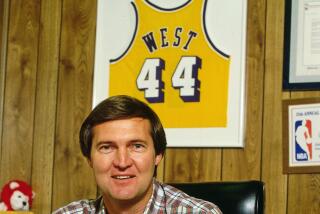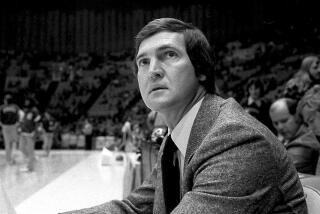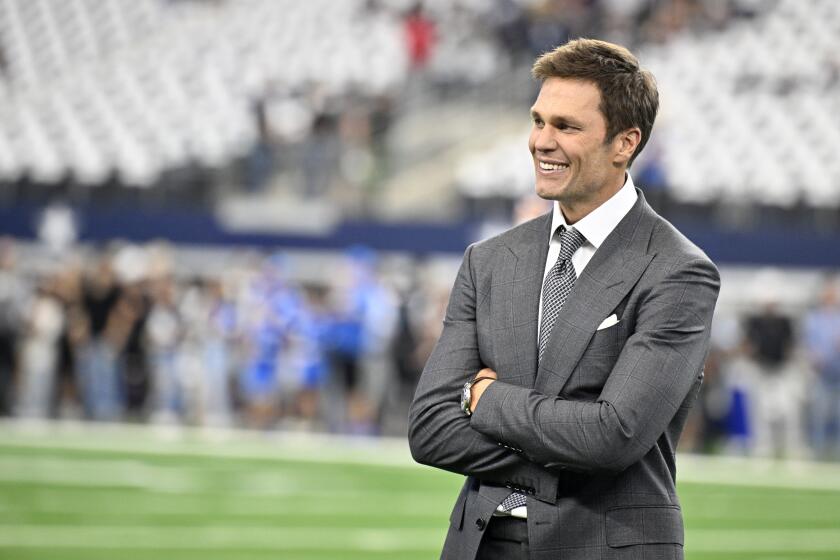Carlisle’s Robotic Reputation Computes to No. 1 in the East
Be careful what you wish for, all you little coaches out there, attending your clinics, drawing your Xs and O’s on napkins in diners at midnight, dreaming your dreams....
Rick Carlisle had a dream job of his own as an Indiana Pacer assistant under Larry Bird. When Bird stepped down, the Pacers hired Isiah Thomas and Carlisle was on the street.
So he went to Detroit, where he became coach of the year as a rookie with the Pistons, then finished fourth in the balloting in his second season, right before they fired him.
Luckily, for Carlisle anyway, Bird, who had just returned to Indiana as general manager, fired Thomas and hired Carlisle back.
Thomas subsequently became the Knicks’ general manager and got to fire a coach too -- Don Chaney.
If you want to know how, astonishingly, 14 of 15 Eastern Conference NBA teams changed coaches within nine months, it started last spring when the Pistons pulled the plug on Carlisle, who, until that moment, had been considered a success story. That set off nine months of musical coaches, only Atlanta’s Terry Stotts surviving, and only because his team was being sold.
Nine months later, Carlisle sat innocently for interviews at All-Star media day, wearing a baseball cap, his forelock tumbling boyishly over his forehead, as earnest as ever but no more colorful.
His presence as an All-Star coach represented an epic turnaround, so everyone plumbed the depth of his heartbreak. Unfortunately, he was not Dennis Rodman and this wasn’t the Oprah Winfrey show.
“Hey, my experience in Detroit was great,” Carlisle said, acting as though he were serious.
“For two years I had terrific players who wanted to win, and for a first-time coach to get into a situation like that was a great opportunity. I owe a lot to [GM] Joe Dumars and to Mr. [owner Bob] Davidson for giving me that chance.
“You know, when it was over, I looked back and just felt really fortunate to have had the chance.”
He probably felt really fortunate to have had all summer to relax and collect unemployment too. In Detroit, reporters called Carlisle “Rain Man” for his somber tone and “robotic” for his emotional range. Even Bird, his sponsor, says, “He’s just a weird dude.”
Of course, students of the game might also have noticed that Carlisle took a 32-50 Piston team to two 50-win seasons, won two division titles and is still in first place in the same division with a different team.
Who knows, maybe it’s not a coincidence.
“He won 50 games [in each of his two seasons] with a Detroit team that didn’t have as much talent as we have,” says the Pacers’ Jermaine O’Neal. “So you put him with a team that has the talent and the ability that we have, I mean, it’s a great thing.
“I mean, if I had to choose a coach to replace Isiah Thomas, it’d be Rick Carlisle.”
That wasn’t what O’Neal said last summer when he got the news. He went off to the media, saying management had promised him Thomas was coming back, adding that if he’d known what was coming, he wouldn’t have re-signed.
And it wasn’t that O’Neal didn’t know Carlisle, who was an assistant in Portland when O’Neal was a rookie.
This Carlisle person takes some getting used to -- and not everyone does that.
Mowed Down in Motown
Not that there aren’t more out there like Carlisle these days.
There’s a new studious breed of NBA coaches, who weren’t former stars or even former NBA players -- or, in the case of New Jersey’s Lawrence Frank, even a high school player.
They may not look any more dashing than the 5-8 Frank, who’s also known as Doogie Howser and jokes about not being able to get into games or movies; or Houston’s Jeff Van Gundy, or Toronto’s Kevin O’Neill, or Carlisle.
These are the guys who are revolutionizing the game, or choking it by slowing it down, depending on your point of view.
They’re obsessives who worry about spending more time with their VCRs than with their children. They may look sad-eyed, like Van Gundy; dweeby, like Frank; or like a store window mannequin, like Carlisle, but they’re united by a love of the game that’s greater than they could tell you, if they ever opened up to anyone but each other.
They attract fellow obsessives, even if they’re different in every other way, as when Carlisle, a lowly Celtic scrub from upstate New York, hit it off with Bird, the Celtic superstar who used to bill himself as “the Hick from French Lick,” which is where Carlisle used to go in the summer to work out with Larry Legend.
“He’d come down to French Lick and we’d work out and about an hour after we’d worked out, he’d be gone for four or five hours and you wouldn’t see him,” says Bird. “Somebody would say, ‘Where’d Rick go?’ and I’d say, ‘I don’t know; he’ll come back.’
“And sure enough, he’d come back and he’d be doing something, and all of a sudden, he’s gone again ...
“He’s just a weird dude. My wife and I would just go, whatever. That’s just Rick.”
Returning to Indiana in 1997 to try coaching, Bird hired Carlisle to run his offense and Dick Harter to run his defense, turning over X’s and O’s to them. Bird set the tone, though, which included chilling Carlisle out when he got too shrill.
However, Bird never meant to make it a career and three seasons later, within weeks of their 2000 Finals loss to the Lakers, he was gone. Carlisle was considered as his successor, but the job went to Thomas.
Carlisle got his shot a year later but not with an East power. Instead, he took over the downtrodden Pistons, who’d just lost Grant Hill and sunk to 32-50.
Reorganizing their nobodies around 6-8 Ben Wallace, Carlisle improved their defense from 25th to sixth, and changed the 50 losses to 50 wins.
As if to answer speculation that he’d been passed over for the Pacer job because the players didn’t want him, or to show his new players how much he cared, he went to unprecedented lengths.
Late in the season, he even called dozens of writers from other cities, touting his guys for awards, giving everyone his cell phone number in case they ever needed him for anything. He reached one on a Laker trip, in a hotel next to the airport in Miami, after persuading the desk to give out the telephone number.
Whether because of Carlisle’s help or not, Wallace won the first of his consecutive awards for defensive player of the year.
That spring, the Pistons needed a Game 5 victory at home over the Toronto Raptors to get out of the first round. When it was over, a jubilant team President Tom Wilson ran up to Carlisle to congratulate him, but Carlisle shouldered right past him without stopping.
Of course, Carlisle was probably just off in his old thousand-yard stare, thinking of the Celtics in the second round, and hadn’t even seen Wilson.
Nevertheless, the story was still circulating a year later, and others like it. The tone was so tense, Piston beat writers were asking if Carlisle was in trouble at midseason, when it seemed unthinkable on merit.
Dumars later said privately that his bosses had made him dump Carlisle and he grabbed the best coach he could find, who turned out to be Larry Brown, who had just left the 76ers.
Carlisle was resigned to spending another year doing radio commentary when the earth opened up under yet another coach, Thomas, who was fired by Bird.
Bird hired Carlisle, showing that rain doesn’t always fall on the same Rain Man’s head every day.
Home Again in Indiana
With the Nets withdrawing their extension offer to Byron Scott, who was going into the last year of his contract, all but officially confirming speculation he was in trouble, the coaches of the Nos. 1, 2, 3, 4, and 5 finishers in the East were now either gone or going.
When not firing coaches, the East has been busy getting walked on by Western teams in five successive NBA Finals, raising the question of just what is it they’re doing back there?
The Pacers, however, aren’t the basic, little Eastern finesse-you contender. They have one of the game’s best young big men, O’Neal, whom they got the old-fashioned way, stealing him from Portland for Dale Davis, shortly after their 2000 Finals loss to the Lakers.
In fact, Pacer President Donnie Walsh had started retooling the season before, trading Antonio Davis for the draft rights to a high school player, Jonathan Bender.
Bender remains an unfulfilled promise, but the Pacers hit it big with O’Neal.
“People told me that [trading Antonio Davis] cost us a championship, Tony could have helped us against Shaq [O’Neal],” Walsh says. “I watched Tony against Shaq. If that’s the best we’ve got, we ain’t beating them....
“When I got on the plane to come home [after losing to the Lakers in 2000], I looked at a lot of our guys and I went, ‘They’re never going to do it again. They gave everything they could give. This is over.’
“And that’s when I started making up my mind. I knew Rik [Smits] was going to retire. Jack [Mark Jackson] got a four-year deal in Toronto for big numbers. Then I traded Dale. And that was it.”
With Bird’s leaving, Walsh tried the ex-local hero route again, hiring Thomas, who had two mediocre seasons (41-41 and 42-40) but seemed to break out in his third, with the young Pacers leading the NBA at 39-14 at the break.
However, they were doing a sons-of-Isiah’s-Bad-Boys routine that, pale as it was, kept them in the headlines, leading to recurring suggestions that the officials and the league were out to get them. Ron Artest, a comer but a mercurial one, was suspended so many times for flagrant fouls, the Pacers feared he would just ride off the reservation and never return.
“Oh, I was scared to death last year,” Walsh says. “I was really nervous about it because I couldn’t tell if he could control it or not control it. I was talking to him all the time.... I told him, ‘Look, Ron, you have to change. Because, if you keep going like this, they won’t let you stay in the league.’ ”
The Pacers unraveled from the All-Star break all the way to summer, finishing 9-15, then going home in the first round after being upset by No. 6 Boston.
After an ominous silence, Walsh decided to give Thomas another season. However, in July, he also turned over day-to-day control of the operation to Bird.
Bird, of course, had his own history with Thomas, arising from the Celtic-Piston wars of the ‘80s, during which a hurting Thomas agreed with a Dennis Rodman jibe that Bird would just be another player if he weren’t white.
Nevertheless, Bird says he came back, expecting to keep Isiah.
“When I came in here, I did have an open mind,” Bird said. “I was a little hesitant. I even asked the owners and I even told Donnie, ‘If you want me to wait a year, I’d be willing to wait a year, because it’s a tough situation, not only for me, but it’ll be a tough situation for Isiah because of everybody out there saying, “When are they going to make the change?” ’
“I mean, it was from Day 1, I took the job, Isiah’s gone, Isiah’s not going to be here.”
Worse, if there were people in the organization who thought Thomas deserved one more shot, there weren’t many who had confidence in him as a coach.
So Bird decided not to wait a season. Thomas went. Carlisle arrived. Jermaine O’Neal erupted.
“I think people kind of misunderstood what I was saying about Isiah,” O’Neal says. “Obviously, he was a good coach because he inherited a team that no one wanted to play on, took players like myself, Al Harrington, Ron Artest and Jamal Tinsley and made them players, gave them confidence to be players.
“With me and him, it was more of a personal thing. It was more of a father figure. The whole summer, I had asked them about Isiah and it was, ‘Oh, he’s going to be back.’
“So when it happened, a couple of weeks after I signed, I was a little upset but ... it’s a business. One thing I’ve learned throughout this whole process, you can’t control what happens in the front office. These GMs, presidents and owners are going to do exactly what they think is best.
“What I can control is what happens on the court, sideline to sideline, baseline to baseline.”
Sideline to sideline, baseline to baseline, things look OK for the Pacers.
They’re second in defense, up from last season’s 13th. Before Wednesday’s game against the Clippers, they were tied for the best road record and 4-4 against the top five teams in the West.
“You know, I don’t even think about that anymore,” Carlisle says of the changes he’s seen in a year.
“I’m really enjoying my experience in Indiana. I’m really enjoying the fact I have the privilege to be here, which is a unique privilege that’s been made to happen by our players. I’m looking forward. I don’t look back.”
Forward is good. So far, anyway.
*
(Begin Text of Infobox)
Net Gain
*
Under Coach Rick Carlisle, the Indiana Pacers -- owners of the best record in the Eastern Conference -- are holding opponents to 85 points per game, which is 8.3 points less than last season. A statistical comparison between last season’s Pacer team when Isiah Thomas was coach and this season’s team with Carlisle:
*--* THOMAS CARLISLE 82 Games 60 96.8 Points Scored 89.8 44.1 Field-Goal Pct. 42.8 93.3 Points Allowed 85.0 42.8 Opp. field-goal Pct. 42.7 44.2 Rebounds 42.0 23.3 Assists 21.1 8.4 Steals 8.7 5.4 Blocks 5.3 14.0 Turnovers 13.4
*--*
More to Read
Go beyond the scoreboard
Get the latest on L.A.'s teams in the daily Sports Report newsletter.
You may occasionally receive promotional content from the Los Angeles Times.










